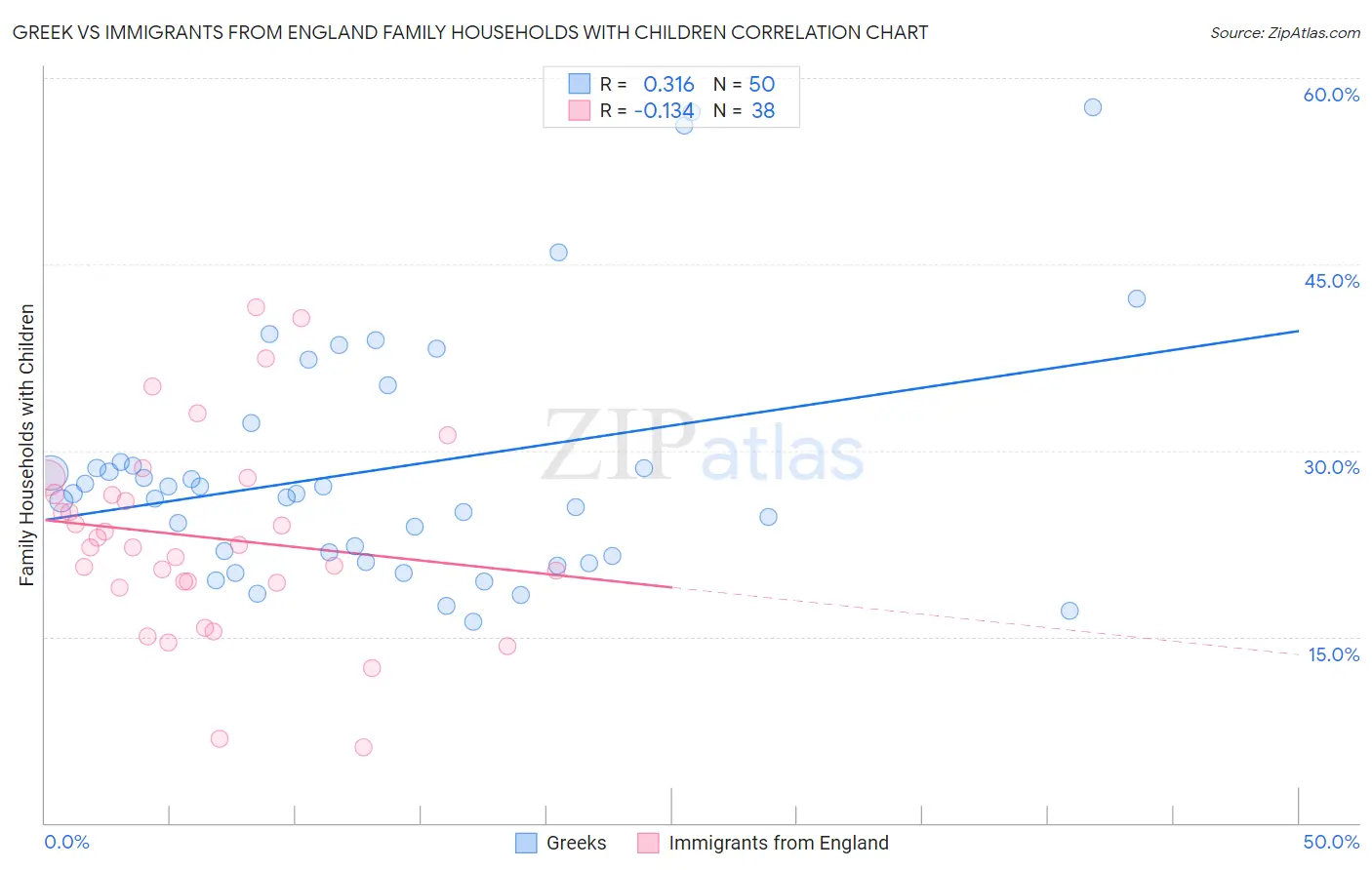Greek vs Immigrants from England Family Households with Children
COMPARE
Greek
Immigrants from England
Family Households with Children
Family Households with Children Comparison
Greeks
Immigrants from England
27.1%
FAMILY HOUSEHOLDS WITH CHILDREN
11.4/ 100
METRIC RATING
218th/ 347
METRIC RANK
26.9%
FAMILY HOUSEHOLDS WITH CHILDREN
3.2/ 100
METRIC RATING
242nd/ 347
METRIC RANK
Greek vs Immigrants from England Family Households with Children Correlation Chart
The statistical analysis conducted on geographies consisting of 482,098,294 people shows a mild positive correlation between the proportion of Greeks and percentage of family households with children in the United States with a correlation coefficient (R) of 0.316 and weighted average of 27.1%. Similarly, the statistical analysis conducted on geographies consisting of 391,583,092 people shows a poor negative correlation between the proportion of Immigrants from England and percentage of family households with children in the United States with a correlation coefficient (R) of -0.134 and weighted average of 26.9%, a difference of 0.76%.

Family Households with Children Correlation Summary
| Measurement | Greek | Immigrants from England |
| Minimum | 16.2% | 6.1% |
| Maximum | 57.7% | 41.6% |
| Range | 41.5% | 35.4% |
| Mean | 28.5% | 23.0% |
| Median | 26.5% | 22.3% |
| Interquartile 25% (IQ1) | 21.5% | 19.3% |
| Interquartile 75% (IQ3) | 29.1% | 26.5% |
| Interquartile Range (IQR) | 7.6% | 7.2% |
| Standard Deviation (Sample) | 10.0% | 8.0% |
| Standard Deviation (Population) | 9.9% | 7.9% |
Similar Demographics by Family Households with Children
Demographics Similar to Greeks by Family Households with Children
In terms of family households with children, the demographic groups most similar to Greeks are Cuban (27.1%, a difference of 0.040%), U.S. Virgin Islander (27.1%, a difference of 0.040%), Immigrants from Japan (27.1%, a difference of 0.040%), African (27.2%, a difference of 0.080%), and Northern European (27.2%, a difference of 0.080%).
| Demographics | Rating | Rank | Family Households with Children |
| Welsh | 14.2 /100 | #211 | Poor 27.2% |
| Immigrants | Dominica | 13.9 /100 | #212 | Poor 27.2% |
| Okinawans | 13.7 /100 | #213 | Poor 27.2% |
| Africans | 13.0 /100 | #214 | Poor 27.2% |
| Northern Europeans | 12.8 /100 | #215 | Poor 27.2% |
| Cubans | 12.2 /100 | #216 | Poor 27.1% |
| U.S. Virgin Islanders | 12.1 /100 | #217 | Poor 27.1% |
| Greeks | 11.4 /100 | #218 | Poor 27.1% |
| Immigrants | Japan | 10.7 /100 | #219 | Poor 27.1% |
| Austrians | 9.9 /100 | #220 | Tragic 27.1% |
| New Zealanders | 9.6 /100 | #221 | Tragic 27.1% |
| Paraguayans | 9.4 /100 | #222 | Tragic 27.1% |
| Pima | 9.2 /100 | #223 | Tragic 27.1% |
| Germans | 8.7 /100 | #224 | Tragic 27.1% |
| Canadians | 7.5 /100 | #225 | Tragic 27.1% |
Demographics Similar to Immigrants from England by Family Households with Children
In terms of family households with children, the demographic groups most similar to Immigrants from England are Navajo (26.9%, a difference of 0.0%), Immigrants from Bulgaria (26.9%, a difference of 0.010%), Moroccan (26.9%, a difference of 0.030%), Immigrants from Southern Europe (26.9%, a difference of 0.030%), and Immigrants from Netherlands (26.9%, a difference of 0.040%).
| Demographics | Rating | Rank | Family Households with Children |
| Immigrants | Morocco | 4.2 /100 | #235 | Tragic 27.0% |
| Cape Verdeans | 3.6 /100 | #236 | Tragic 26.9% |
| Immigrants | Netherlands | 3.5 /100 | #237 | Tragic 26.9% |
| Moroccans | 3.4 /100 | #238 | Tragic 26.9% |
| Immigrants | Southern Europe | 3.4 /100 | #239 | Tragic 26.9% |
| Immigrants | Bulgaria | 3.3 /100 | #240 | Tragic 26.9% |
| Navajo | 3.2 /100 | #241 | Tragic 26.9% |
| Immigrants | England | 3.2 /100 | #242 | Tragic 26.9% |
| Immigrants | Saudi Arabia | 2.9 /100 | #243 | Tragic 26.9% |
| Ukrainians | 2.9 /100 | #244 | Tragic 26.9% |
| Australians | 2.8 /100 | #245 | Tragic 26.9% |
| Jamaicans | 2.5 /100 | #246 | Tragic 26.9% |
| Potawatomi | 2.2 /100 | #247 | Tragic 26.9% |
| Immigrants | Kazakhstan | 2.2 /100 | #248 | Tragic 26.9% |
| Immigrants | Eastern Europe | 2.1 /100 | #249 | Tragic 26.9% |